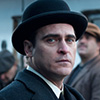In The Immigrant, Marion Cotillard plays Ewa, a Polish woman whose American Dream is hijacked almost as soon as she lands on Ellis Island in 1921. All alone, she’s threatened with deportation until she’s rescued by Bruno (Joaquin Phoenix) — a schemer as dastardly as Pinocchio‘s Stromboli, who forces her into a hard life of servitude and prostitution.
Bruno’s cousin, a magician named Orlando (Jeremy Renner), offers Ewa a ray of hope. And in this exclusive clip from the film, Orlando demonstrates a feat as wondrous as the American Dream itself — as long as you’re willing to ignore the tricks that make the illusion possible.
Director James Gray (We Own the Night) based the film in part on the hard-luck immigrant tales his grandparents told him when he was a child. “One of the funnier things I read in the research I was doing was, an immigrant was asked, ‘How do you feel about America?’ He said, ‘Well, they told me the streets were paved with gold. But I didn’t realize that the streets wouldn’t be paved at all, and I would be the one who needed to do the paving,’” says Gray.
Click below for the clip from the film, which opens May 16, and an extensive Q&A with Gray.
ENTERTAINMENT WEEKLY: The Immigrant debuted at Cannes last year, but it premiered in New York on Tuesday night. How was the reception?
JAMES GRAY: Last night was wonderful. You know, it’s really the hometown crowd. You got a movie about New York and Ellis Island and the Lower East Side. This is the place where people understand the film the most, so it was very gratifying. It’s such an American movie in so many ways. Cannes is fine, Cannes is fun. There were some wonderful reactions out of Cannes, but you go to Cannes and they say, [in French accent] “What is dis Ellis Island?” They don’t really get it.
On a superficial level, the film is very different from your previous New York-based work, in that it’s a period piece with a female protagonist.
I went to see a production of Puccini’s Il Trittico in L.A. in which the two tragedies were directed by William Friedkin and the comedy was directed by Woody Allen. It was really fantastic, and [one of the tragedies] Suor Angelica, which was about a nun who lives in a convent and she has a child out of wedlock, is a profoundly moving opera. It was focused on a woman, and it was sort of like someone gave me the key and I didn’t even know there was a lock or a door. All of sudden, I just thought how beautiful it was because there were no pretensions about macho gun play or anything like that. It was just openly emotional, and I just really thought, “Well, people don’t really make those movies now” — but they used to. They made movies with Barbara Stanwyck and Greer Garson. They don’t do that anymore. So it was really my attempt to be a throwback but with a bit of modern twist to it.
The film is very much a dissection of the mythology of the American dream. It makes me think of Robert Altman’s McCabe and Mrs. Miller, which did a very similar thing with the American West.
You’re beyond on target. That’s incredible you would mention that movie. Nobody else has mentioned that to me, except for the fact that we stole everything from that movie. We watched that movie a lot. Vilmos Zsigmond’s photography, the kind of demythologizing of the American West, it’s such an incredible movie. And the thing that’s so impressive about it is, what I talked about with the cinematographer Darius Khondji and the actors over and over again, is the idea of the American dream. It’s not that it’s a lie. It’s not a lie. But it’s also not a fantasy. The American Dream is something worth fighting for and striving towards, and the reality of it, of course, is more complicated. But I think if you acknowledge the reality of it, it makes it a more potent kind of idea.
In other interviews, you’ve criticized yourself for being bad at directing actors, but you have worked with some very esteemed actors who seem very much on the same page as you. What gives?
I think I’m pretty good at casting. In other words, choosing people who hopefully would want to do the film, who are right for the part. And I think I’m very good at loving actors, and I think that makes up for my kind of ineptitude about being able to speak to them on the set. If you love actors, that goes a long way, because you have to just give them the space to do what they do. That’s not really about direction. And when you work with people like Ellen Burstyn and Robert Duvall and Joaquin and Marion and Vanessa Redgrave and Charlize Theron — all the incredible people I’ve worked with — I mean, come on, they make you look good. Let’s be honest. It’s not like I’m getting a great performance out of my friend, Fred.
I’m always fascinated by casting and, in particular, casting what-ifs, especially when there’s two strong roles with two powerful actors. Did you always envision Joaquin as the pimp and Jeremy as the magician, or did you ever contemplate the reverse?
There was never an issue about who would play what — but you could make an extremely interesting film with the opposite casting. The issue would be then you would have to focus on different aspects of their personalities. With Jeremy, I think the pimp would be overt and direct, and with Joaquin as Orlando, you would have to find the sweetness. Joaquin is a very sweet person in real life, but as an actor, he projects real danger, which by the way, is great. But it’s not the light of hope. All of sudden, Joaquin’s Mr. Brooding comes in, so it would be very interesting.
This is your fourth film with Joaquin, and you obviously have a rapport and a shorthand at this point that you probably don’t have with other actors. Can you verbalize what that relationship is like on the set of a film?
Once the shooting starts, I talk with him very little. The conversation is shockingly brief. And oftentimes it’s non-verbal. So I’ll say to him, “Joaquin, on that last take–” And he’ll go, “I know, I know.” And then he’ll just do, somehow, exactly what I was hoping he would do to correct whatever it is I didn’t like in the previous take. And he’s extremely inventive, so I let him go. That doesn’t mean he goes over the top. You have to reign every actor in if they’re going over the top. But there are times when he’s doing inventive things that I did not suspect or anticipate from the screenplay, and that’s a fantastic thing for a director. You know, the greatest direction ever was from Claude Chabrol where he said, “Surprenez-moi,” which means “Surprise me.” That’s so true, and that’s what Joaquin does. We’re making a film and all of sudden he’s doing things that seem like someone from Mars would be doing. And that’s great.
Did your relationship with him have to be repaired after his I’m Still Here fake documentary, which became a side-show during the release of your last film, Two Lovers?
No, no, no. The thing that’s interesting about my relationship with Joaq is that we love each other very much and we’re extremely close. And yet, we really never talk once the film is over. I can’t control what Joaquin does after the work is over, nor I should be able to, just as he can’t control what I’m doing. So I wasn’t thrilled that he got on David Letterman and totally distracted from a movie that even David Letterman seemed to think was great. But at the same time, he does what he wants to do. He’s a grown up. It is what it is. For selfish reasons, I can’t be pissed for very long because the guy is just top notch. You don’t really get a chance to work with top-notch actors a lot who will work with you, so you seize that opportunity when you get it. You can’t stay mad for too long.
I know you had been working on a science-fiction movie, which would be something I think most everyone interested in your work would be fascinated to see. Is that still in the works?
Absolutely. I’m fairly obsessed with it. It’s a very big-scale thing, though, so it’s going to be a tough and wonderful thing to mount. It’s very different from anything I’ve done. But it’s less science-fiction-y and much more a science-backed movie almost. It’s almost like a Heart of Darkness in space kind of thing. And it would be using a realistic approach. Not like Gravity, which I admire by the way, but it would be like Apollo 11 footage, directed that way. That’s the ambition I have for it.
Is that your next film?
It depends. Whichever one is ready first. There’s also The Lost City of Z, which has Benedict Cumberbatch now involved, so that might be something I do next. And I’ve got another thing at Warner Bros. I’m writing, called White Devil. It depends which one comes together first. Because I’d like to make more films. It’s a beautiful honor to be able to do it. Other than when I’m with my children and my wife, it’s really the only time I’m happy.
Source Article from http://insidemovies.ew.com/2014/05/07/jeremy-renner-the-immigrant-exclusive/
James Gray's 'The Immigrant': First Look
http://insidemovies.ew.com/2014/05/07/jeremy-renner-the-immigrant-exclusive/
http://news.search.yahoo.com/news/rss?p=immigrant
immigrant – Yahoo News Search Results
immigrant – Yahoo News Search Results


